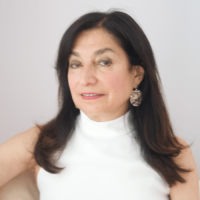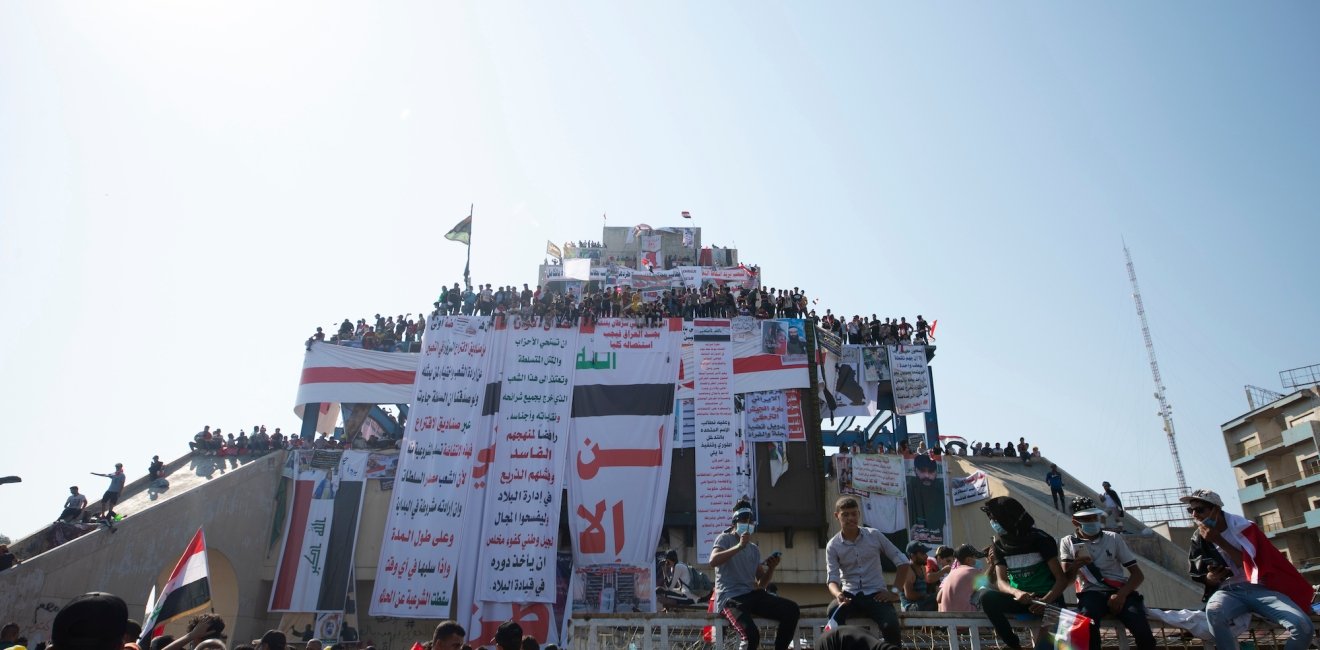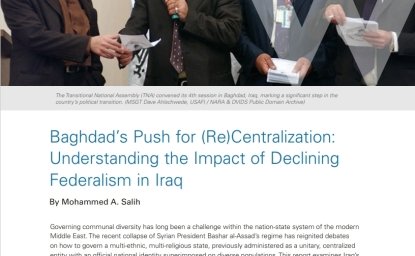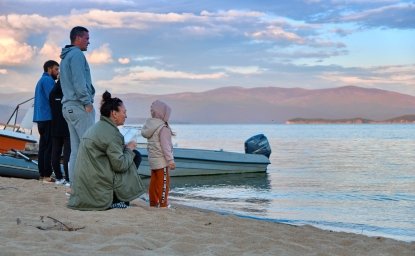Thousands of Iraqis took to the streets on Saturday, October 1 in anti-government protests to mark the anniversary of nationwide demonstrations that erupted three years ago and have continued sporadically since then. The protests in 2019 were largely staged by a young, passionate generation of Iraqis demanding political and economic reform and an end to foreign interference in Iraqi politics.
The emergence of the protest movement, called Tishreen (the Arabic word for October), in 2019 seemed to foreshadow a different Iraq, where some of the demonstrators’ goals would be realized – particularly because less than a month after the unrest began, then-prime minister Adel Abdul Mahdi was forced to resign as part of the street demands. Young people camped in Tahrir Square for months, demanding an end to widespread government corruption, poor public services, and high unemployment. They also called for dismantling the political system, which is based on a less-than-transparent sectarian power-sharing arrangement among an older generation of political elites. Some of the young demonstrators even took their movement from the streets to the ballot box and formed political parties, some of which did well in the October 2021 national elections and secured seats in parliament.
Their demands were the same as three years ago: security, jobs, and basic services.
However, the Tishreenis, or the Tishreen protesters, who clashed with government security forces this past weekend were expressing anger and frustration. Once again they gathered in Tahrir Square. “We want to overthrow the regime,” they shouted. Their demands were the same as three years ago: security, jobs, and basic services.
For them, the political and economic situation has only worsened. Three years after the protest movement began on a massive scale, and nearly a year after national elections were held in 2021, there is no new government in Baghdad. And, since this summer, violence has engulfed Iraq’s streets in clashes between different demonstrators than those Tishreenis from 2019 and 2020. The demonstrators this summer were largely loyal to maverick Shia cleric Muqtada al-Sadr, who forced a deadlock in parliament when he was unable to form a government, after his coalition won more seats than any other in the 2021 elections. Sadr challenged the system and instead of forming a government with other Shia parties, Sunnis, and Kurds, he tried to establish a government that excluded his rival Shia parties, which are backed by Iran. When he failed to form a government, he forced his 73 MPs in the parliament to resign. This left the door open for his Iranian-backed rivals to try to form a government without him – one in which they would lead.
The clashes between Sadr’s militia and the Iranian-backed factions and militias led to street battles in the fortified Green Zone, the area of Baghdad that is home to diplomats and high-ranking Iraqi officials. More than 30 people died last summer. At one point, Sadr’s supporters took over the parliament building.
When the Tishreenis went back to the streets this past weekend, dozens were reported injured after Iraqi security forces used tear gas and other methods to disperse the crowds. They held portraits of those killed in the protest movement in 2019-2020, when at least 600 were killed and tens of thousands were wounded. At the moment, the country’s political focus is no longer on the protest movement’s lofty goals of moving toward a secular state by dismantling the sectarian power-sharing system and getting rid of government corruption. The government’s immediate objective is to form a new government and prevent a civil war between Sadr’s millions of loyalists and his Shia rivals.
At the heart of the protest movement was a determination to move toward a nationalist Iraqi identity, which is not based on sect or religion.
This short-term goal to get Iraq out of a crisis is certainly not what the young protesters had in mind three years ago. The protest movement, which has the backing of Iraqis nationwide, wants to address the fundamental problems in the country, one of which is that the older political elites operate according to a loosely defined power-sharing system, called muhasasa in Arabic, which refers to the appointment of political positions among sectarian parties. At the heart of the protest movement was a determination to move toward a nationalist Iraqi identity, which is not based on sect or religion.
This ideal conflicts with the muhasasa system that has served to ensure political power primarily for Kurdish parties and Islamist Shia parties, which often comprise the majority of blocs in elections. In this system, voters have no direct say in who becomes president and prime minister. The selection of these posts is decided in backroom negotiations and heavily influenced by the factions that won the most seats in the parliamentary elections. The selection process is also influenced by outside interference from countries, such as Iran, which are directly affected by the outcome. After the 2018 and 2021 elections, Iranian officials traveled to Baghdad to try to influence the appointments of these two positions. In previous elections, all of this chaos generally led to governments being formed many months after the elections were held.
Even if a new government is formed, there is little hope it will be willing or able to address the Tishreen protesters’ demands.
But this time, the delays are even longer since the last parliamentary elections in October 2021. With no new government formed and ongoing violence between Sadr’s forces and the Iranian-backed militias, Iraq is at a standstill. Even if a new government is formed, there is little hope it will be willing or able to address the Tishreen protesters’ demands. The protesters of 2019-2020 were largely comprised of unemployed, disaffected youth with no allegiance to a political party. There were, however, protest leaders who were middle class and educated who formed their own political parties.
A study published in 2021 by the Global Partners Governance on the economic drivers of the protest movement, stated: “Employment and career choices are the biggest concerns for young people. There has been a longstanding mismatch between university education in Iraq and the demands of professional life and the job market. Young people feel at a disadvantage compared to well-qualified workers from abroad, who are perceived as taking the most attractive jobs.”
Regarding women, who were more active in the 2019-2020 protests than at any other time, the study stated: “Young women face very pronounced economic barriers, with dramatically lower labor force participation…Women in southern Iraq feel marginalized by a conservative and patriarchal society that restricts their choices.”
Corruption is another fundamental problem Iraqis find disturbing that any new government will be unlikely to address, which is one of the primary grievances Iraqis have against their government and one of the leading drivers of political mobilization. According to polling conducted by Al-Mustakella for Research Group’s Independent Institute of Administration and Civil Society Studies, government corruption was the main concern for 39 percent of Iraqis in 2019, which was a sharp increase from 2004 when only 13 percent said corruption was a main concern.
The third anniversary of the protests was a reminder to Iraq’s young generation that, even if it seemed they had made some progress, Iraq’s entrenched political system and economy perpetually on the verge of crisis will likely be with them for the foreseeable future. The 2019-2020 protest movement exposed the great flaws in Iraq since the 2003 US-led invasion and forced old political elites to open the political system to a younger generation. But the current deadlock has been a setback. The question is whether the protesters will give up in their quest for change or wait for another opening or another opportunity.
The views expressed in these articles are those of the author and do not reflect an official position of the Wilson Center.
An earlier version of this article incorrectly stated the name of the former Prime Minister of Iraq as Abdel Abdul Mahdi. The correct spelling of the former prime minister's name is Adel Abdul Mahdi.
This article was updated at 10:50am on October 6, 2022.
Author


Middle East Program
The Wilson Center’s Middle East Program serves as a crucial resource for the policymaking community and beyond, providing analyses and research that helps inform US foreign policymaking, stimulates public debate, and expands knowledge about issues in the wider Middle East and North Africa (MENA) region. Read more





